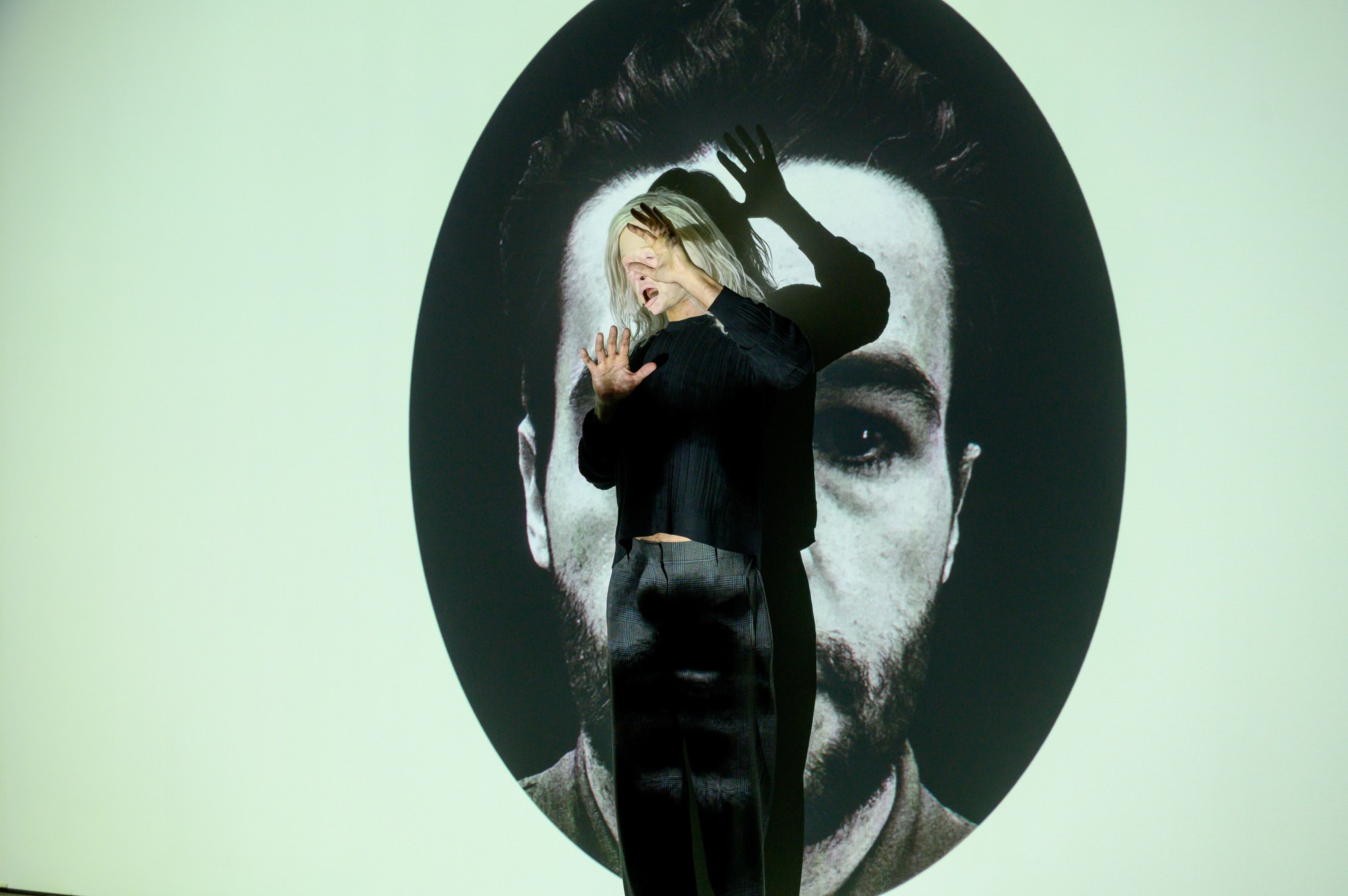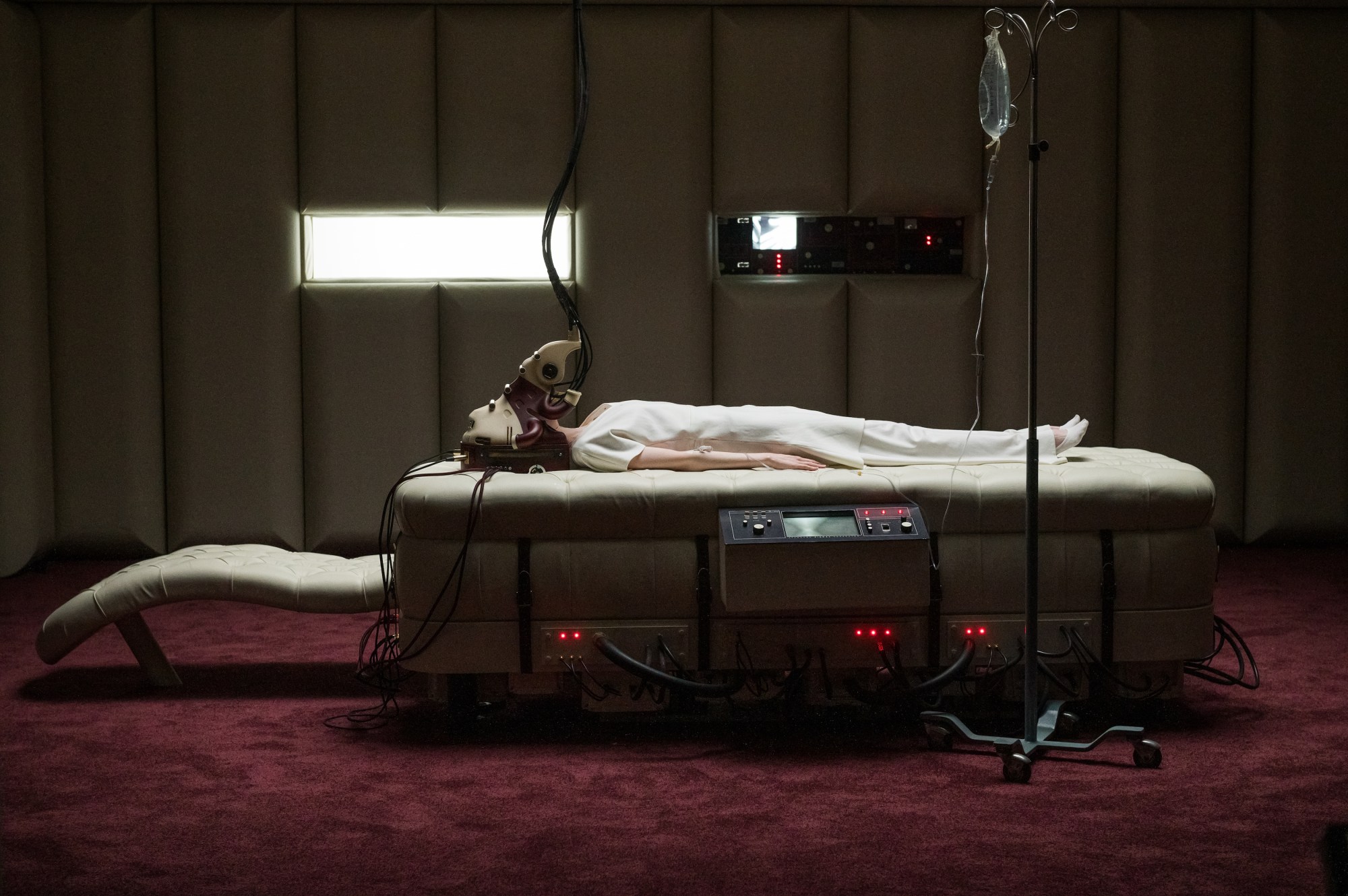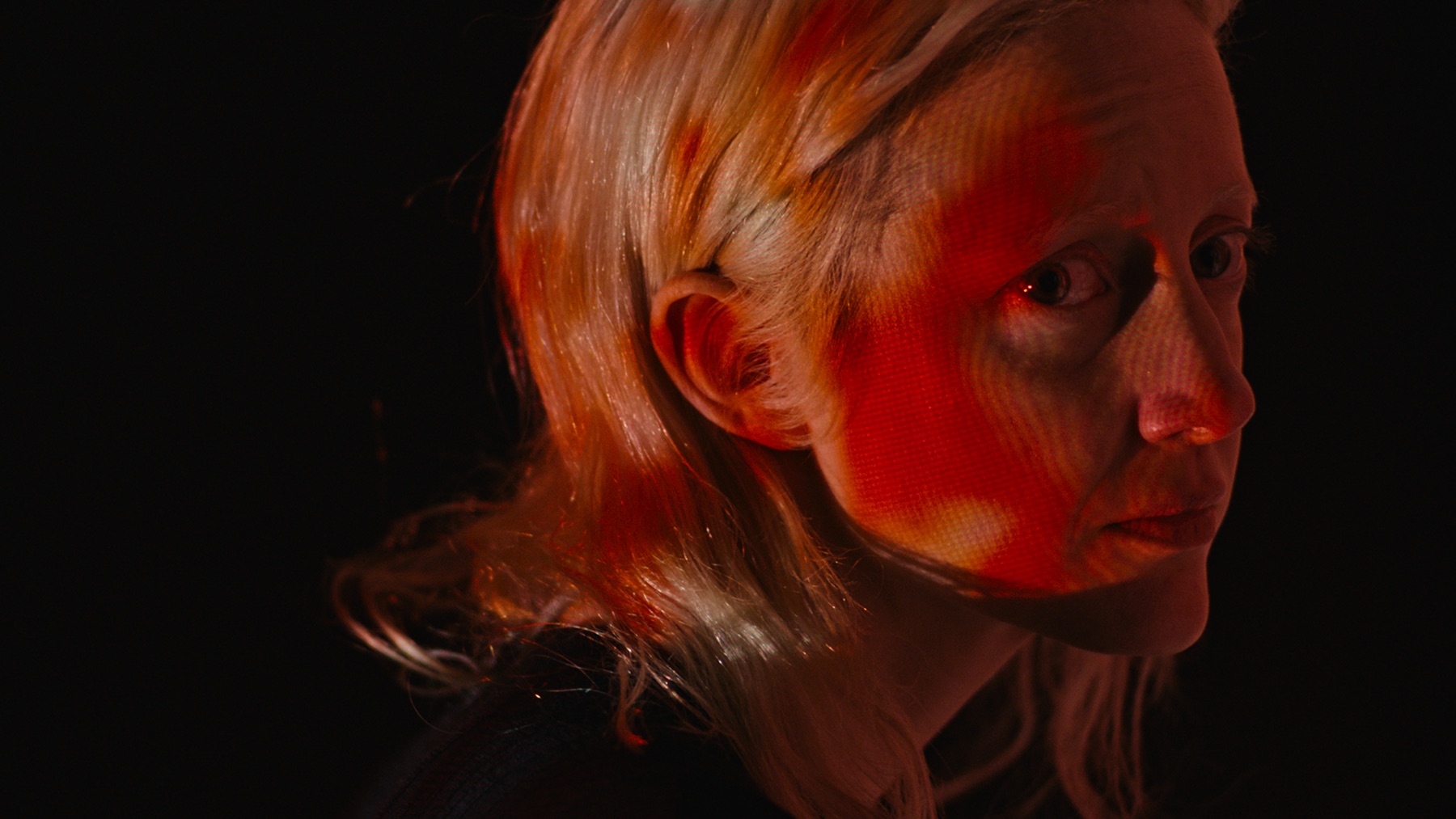Tasya Vos (Andrea Riseborough) isn’t herself. In fact, she’s someone else entirely in the opening scene of Possessor, writer-director Brandon Cronenberg’s grisly new horror movie. An elite assassin who transports into the bodies of other people with technology, and uses them to take down her clients’ enemies, Tasya has others do the dirty work for her. On this particular mission, she’s pulling the strings of a woman named Holly (Gabrielle Graham), who makes her way through a hotel lobby and up to a posh soirée where the target is located, mingling among the other attendees. Tasya’s training mandates a clean gunshot to the victim’s head, and then the surrogate’s, which launches Tasya’s mind back to her own body. Instead, Holly grabs a steak knife and repeatedly stabs the man to a bloody pulp. Such an unsettling and excessive display of violence goes to show that technology may have real, terrifying effects; it might even encourage dark, buried behaviors to come out in the open.
Cerebral techno-horror that isn’t afraid to be disgusting, Possessor might be described as a mashup of The Matrix, Under the Skin and Inception, but dosed with a bit of the old ultraviolence. Son of body horror maven David Cronenberg, Brandon’s interest in the dark side of technology, and his generous use of guts and ooze, proves the apple doesn’t fall too far from the tree. But the younger Cronenberg’s got his own diverse reference points, from the giallo stylings of Dario Argento’s Opera to Sidney Lumet’s grisly police drama The Offence, Henry Sala’s B-movie classic Nightmare Weekend and the science fiction novels of Philip K. Dick. He also has his own ideas about the nature of human consciousness and agency, the influence of modern technology and the sinister machinations of our corporate overlords.

When Tasya returns to her actual body, she wakes up in a sleek, minimalistic lab; her face is pale and her cheeks are sunken like she’s been on drugs for the past several days. The year is 2008, the place Toronto, yet this world feels more like an eerie dystopian near-future. We know very little about Trematon, her employer, or the purpose of her work, yet this ambiguity only enhances the company’s nefarious, monolithic standing. Tasya’s dispassionate handler (Jennifer Jason Leigh) runs her through a collection of personal items — her grandfather’s pipe, a framed butterfly — to see if she recognizes the authentic totems from the phonies. In occupying the minds’ of others for a living, she runs the risk of losing her own head, and forgetting where she ends and the other person begins.
“[Possessor] is in part an exploration of what it means to have a unified self,” Cronenberg says. “I don’t think we really do. I think that’s an illusion that our brains generate after the fact. Beneath the surface, we are really this chorus of conflicting voices and impulses. Some of them come from our brains, but we’re also influenced externally and unconsciously by other parts of our bodies.”
Tasya passes her self-identification test, but her earlier gnarly outburst indicates that she’s losing her grip on reality, and that her job is slowly poisoning her from the inside. She intuits this and decides to live apart from her husband and child — being with them feels uncomfortable and unnatural for her. “The genesis of the movie came from my own experience going through a period of my life when I was in flux,” Cronenberg explains. “I found myself feeling that I was actually in someone else’s life, having to struggle to construct a character who could operate in that context. So when I began writing the film, I was interested in the ways we build characters and narratives in order to function both for other people and ourselves.”
Before arriving at her family’s house, Tasya rehearses the character she’s playing — the part of a caring mother and wife — and she’s hyper-aware of her performance, not unlike the foreign identities she portrays as a professional body snatcher. This brief dip into domesticity reminds her where she actually wants to be — plugged in and on the field. Yet the guilt of abandoning her family gnaws away at her. Becoming another person and occupying another body is perhaps Tasya’s way of repressing her own anxieties about rejecting her maternal identity.
Her personal issues come to bear in an unprecedented way on her next assignment. Tasked with bringing down John Parse (Sean Bean), a slimy CEO, she takes the identity of Colin (Christopher Abbott), the boyfriend of the target’s daughter. Each mission has a “narrative” — this one will be set up to look like a crime of passion.
This world of hacked brains and impersonal killing isn’t terribly unlike the world we live in today, Cronenberg observes: “In the current social media landscape, we’re obviously finding some fairly alarming ways that people are being influenced by external forces, like the Russians in the US elections. We’re all hackable in a sense, and people are turning against each other, when they’re actually being turned against each other through foreign influence.”

In the days leading up to Parse’s murder, Tasya has trouble adjusting to life as Colin and keeping her own emotions under control. The act of waking up in a strange apartment next to someone you don’t know, acting as if everything’s normal, and having sex with that person, when they have no idea who’s embracing them. Under these conditions, it’s easy to lose sight of the real person behind the mask. The host’s mind begins to encroach on Tasya’s, and a surreal battle ensues over control of Colin’s body. In an experimental, disorienting sequence somewhere between a DMT trip and a fresh concussion,Tasya’s brain seems to implode as Colin’s consciousness claws its way back to the surface. The body count increases well beyond the mission’s intentions as a result, and each killing is more depraved and spectacular than the last, with head-mashings and liquid flesh stabbings galore.
“To me, it’s more disturbing to watch a PG-13 film where 100 people get killed and no one bleeds,” Cronenberg says of his penchant for blood and gore. “I feel in a way that that’s sanitizing violence and being dismissive of it. Possessor is about [Tasya’s] relationship to violence and these grueling experiences she’s having. So I wanted the violence to be visceral so that the audience can connect to her experiences on an emotional and physical level.”
In the end, things get extra bleak when Colin heads to Tasya’s family home for some retribution. A hellish dining room showdown is the cherry on top to Cronenberg’s parade of mutilated corpses. Though ultimately, Tasya returns to Trematon headquarters, ready to do it all again. The violent spectacle and lobotomized reaction from Tasya doubles as a biting indictment of technology’s impact on us all and how it warps the brain and body in terrifying ways. Thinking about the future in light of our various technological developments keeps Cronenberg on his toes: “I’m not technophobic by any means, but at the same time, it’s really changing who we are, and how we interact with each other in ways haven’t even begun to comprehend. Whatever humanity is about to become, we’re only getting a taste of it.”



